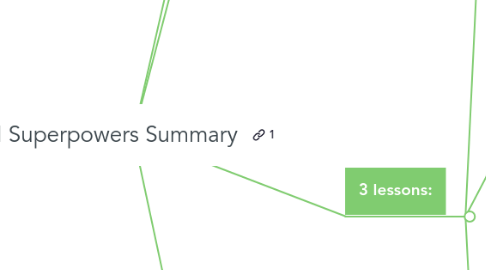
1. 1-Sentence-Summary:
1.1. AI Superpowers will help you understand what to expect of the effect that artificial intelligence will have on your future job opportunities by diving into where China and the US, the world’s two leaders in AI, are heading with this breakthrough technology.
2. Favorite quote from the author:
2.1. "AI will do the analytical thinking, while humans will wrap that analysis in warmth and compassion." - Kai-Fu Lee
3. 3 lessons:
3.1. Nearly everything in our world is on the verge of succumbing to automation due to great breakthroughs in deep learning.
3.1.1. Making computers as intelligent as humans dates back to the 1950s.
3.1.1.1. John McCarthy and Marvin Minsky, for example, were two researchers with a desire to embed human intellect into computers.
3.1.2. By the time of the author’s entry into the field in the early 80s, there were two camps: rule-based and neural network.
3.1.2.1. Rule-based folks thought to teach machines one law at a time.
3.1.2.2. Those on the neural network side let computers learn on their own and develop intelligence with experience.
3.1.2.2.1. But these machines needed a lot of data to grow.
3.1.2.2.2. This problem was solved in the early 2000s when AI researcher Geoffrey Hinton had a breakthrough that significantly multiplied processing power.
3.1.2.2.3. His new algorithm smashed the competition at visual recognition in a 2012 contest.
3.1.2.2.4. This was when the technology began going by the new name of deep learning and opened the way for countless possibilities.
3.2. Authorities and experts are largely divided on the future that AI will bring for humanity.
3.2.1. Many of us wonder if we’ll be able to hold a job when AI can do it for us.
3.2.2. Experts like Ray Kurzweil believe that machines are the tool that can finally upgrade our own bodies and minds.
3.2.2.1. We can get smarter and live longer with this technology.
3.2.3. Another AI researcher by the name of Demis Hassabis has the vision that AI can help us cure diseases and end problems like climate change.
3.2.4. On the other side, however, we’ve got Elon Musk and Stephen Hawking.
3.2.4.1. These two and others in their camp see AI as a threat to our species.
3.2.4.2. You might get a computer to provide a solution to global warming, but what happens when part of that is the eradication of humans from the planet?
3.2.5. Economically there’s a great divide as well.
3.2.5.1. This mostly comes from a 2013 Oxford study that declared 47% of US jobs are at risk of automation.
3.2.5.2. As companies want to cut costs and boost profits, letting computers do as many tasks as possible becomes pretty appealing.
3.2.5.3. Other research indicates that tasks will be automated but not entire jobs.
3.2.5.4. Some studies put the estimate of jobs at risk as much lower.
3.2.6. The truth is, we are doing the research and learning more every day.
3.3. There is at least one significant quality of humans that sets us apart from computers and gives us irreplaceable advantages over them.
3.3.1. Relationships are what really matter and give our lives meaning, and thankfully they are also what set us apart from AI.
3.3.2. We’ve got a great chance to give many undesirable jobs to computers and make the important aspects of our lives better.
3.3.3. But we’ve got to make some changes to the type of work we value for this to work.
3.3.3.1. Our world’s highest-paid positions are those that create profit, but these are the ones that can most easily benefit from automation.
3.3.3.2. Jobs that require a person, like caregivers and personal aids, are underpaid but are more difficult to turn over to computers.
3.3.3.3. First, we can let AI create profit in the business areas.
3.3.3.4. Then we might have a better chance of increasing the appeal of social-oriented jobs by paying what workers in them deserve.
3.3.4. For this to work best it might require taxing the wealthy to make a universal basic income possible.
3.3.4.1. Relying on this alone wouldn’t be enough, however.
3.3.5. We need an entire societal shift to value money and profits less.
3.3.5.1. Our focus must be on the relationships and love that sets us apart from computers.
